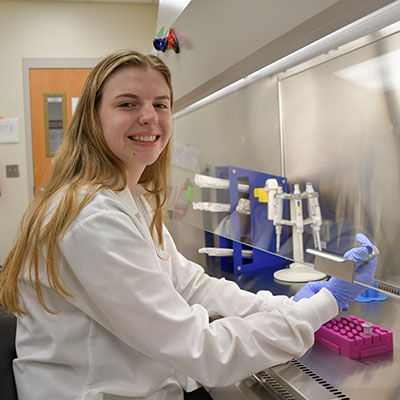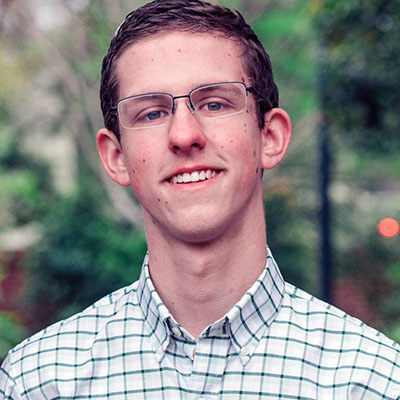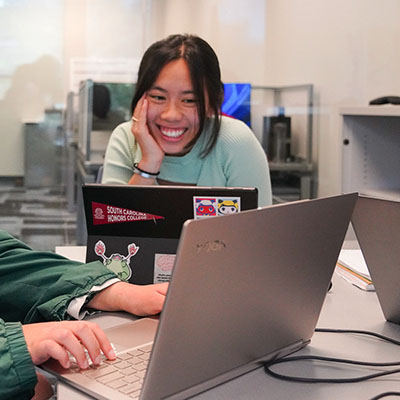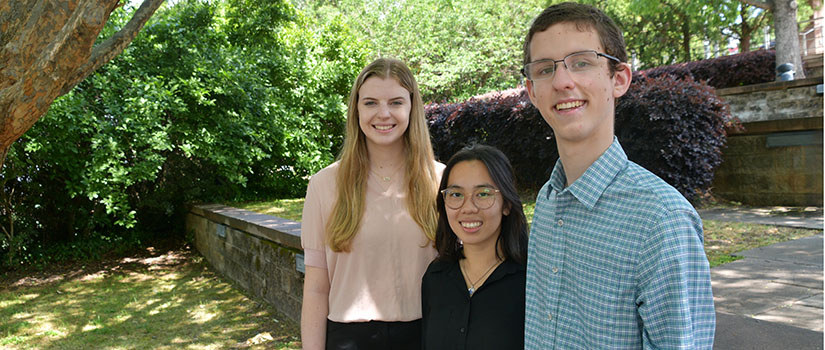Pictured (L-R): Caroline Rucker, Katelyn Wyandt, Jeremiah Tobin
Since 1989, the Barry Goldwater Scholarship and Excellence in Education Foundation has awarded more than 10,700 scholarships to students who intend to pursue research careers. Earlier this month, the foundation awarded 438 scholarships nationwide, and the University of South Carolina’s three recipients are all College of Engineering and Computing (CEC) students.
Biomedical engineering juniors Caroline Rucker and Jeremiah Tobin, and computer science and engineering junior Katelyn Wyandt, who are all students in the USC Honors College, were selected as Goldwater Scholars from an estimated pool of over 5,000 college sophomore and juniors. As a Goldwater scholar, each awardee will receive a $7,500 yearly scholarship and have access to a large network of leading researchers who can help provide mentorship and career opportunities.
“The fact that the CEC had three Goldwater Scholars in one year is a testament to our dedication to excellence in engineering education, research and mentorship. The success of our scholars reflects their considerable talent and our faculty's commitment to nurturing scientific innovators and future thought leaders,” says CEC Dean Hossein Haj-Hariri.
Caroline Rucker ‘25
Biomedical Engineering
Hometown: Powhatan, Virgina
Rucker’s research experience started before she arrived in Columbia. During her senior year of high school, she worked in a laboratory at Virginia Commonwealth University (VCU) as part of an intensive research and mentorship program. Once at USC, she found a research mentor in Chemical Engineering and Biomedical Engineering Associate Professor Michael Gower.
“My research at VCU involved the use of lab-on-a-chip devices to examine the breast cancer tumor microenvironment,” Rucker says. “It was in the biomaterials realm, so when I came to USC and looked at the faculty research database, Dr. Gower was on my radar because he worked with cells, the immune response and biomaterials. “I eventually talked to a student who was working with him and the more I learned about Dr. Gower and his research, the more I was interested.”
Gower and Chastity Graham, national fellowships coordinator for the Honors College, both encouraged Rucker to apply to the Goldwater Scholars program. As Rucker learned about the prestige of the program, it was something she wanted to pursue.
“It’s an honor to be recognized alongside so many people who will be a part of the next generation of leaders in my field,” Rucker says. “Even just going through the application process allowed me to reflect on my interests and why I’m doing research.”

Rucker has worked with Gower on bio-inspired polymer particles for the treatment of chronic inflammation, which is considered a cause for a variety of health conditions. They have fabricated the particles and functionalized them with a phospholipid, which is the main component of the cell membrane and acts as a signal to enter cells.
“We've engineered particles that take advantage of a biological process to get into cells more readily. Our ultimate goal is to encapsulate anti-inflammatory drugs in the particles, which will help achieve a more targeted drug delivery,” Rucker says.
Rucker’s project associated with the Goldwater Scholars program will focus on using a synthetic phospholipid instead of one derived from a porcine (pig) brain.
“Using a synthetic phospholipid in our particles helps improve the viability of clinical translation because it eliminates the risks associated with having an animal derived substance in drug products,” Rucker says. “My research will compare the anti-inflammatory effects of the synthetic molecule to an animal-derived one to validate its efficacy.”
According to Gower, in addition to her scholarship, he has also been impressed by Rucker’s stewardship to the CEC community.
“For example, through volunteering at the Gamecock CommUnity Shop, Caroline has no doubt played a role in retaining students at our university and helping them thrive. I have enjoyed working with Caroline and look forward to her future accomplishments,” Gower says.
Rucker believes that her work and research as a Goldwater Scholar will have an impact in achieving her future goals of pursuing a Ph.D. in biomedical engineering and becoming a university professor and researcher in the immunoengineering field.
“Being named a Goldwater Scholar will certainly aid me in my path to attending graduate school and pursuing my chosen career,” Rucker says. “So far, it has helped me develop confidence in communicating my ideas and interests.”
Jeremiah Tobin ‘25
Biomedical Engineering
Hometown: Greenville, South Carolina
Tobin first learned about the Goldwater Scholars program after fellow biomedical engineering student Shannon DePratter was one of four recipients from USC last year. But it was Mark Uline, chair of the Department of Biomedical Engineering, who encouraged him to apply because he believed his research was interesting and that he would be a strong candidate.
“Being a Goldwater scholar is a validation that what I do matters and is interesting and makes me feel good about my work and research,” Tobin says. “It gives me more inspiration to go to grad school and continue pursuing my research, knowing that there are people who care about what I’m doing.”
According to Tobin, he chose to major in biomedical engineering because he always enjoyed math, chemistry and physics courses. But his inspiration to pursue research was a course taught by Uline that focused on cell molecular biology for biomedical engineers. It was also where Tobin first met Uline and how he eventually began working with him on research projects.
“We learned about all the different components of the cell and basic thermodynamics, and it’s still my favorite class to this day,” Tobin says. “We also did Michaelis-Menten kinetics, which is using math to predict how enzymes work, and the biggest inspiration for my current work.”
Tobin’s current research focuses on biophysical modeling, which could have various applications in immunology. Instead of biology research, which examines organisms and cells with different chemicals, biophysical modeling takes chemistry and physics principles, mathematics, and statistical mechanics and uses them to better understand its biology and how they work. The Goldwater Scholars funding will support Tobin’s research in modeling immunosensor proteins in the aorta.

“I’m particularly looking at inflammasomes, which are basically signaling platforms that cause inflammation,” Tobin says. “We're doing modeling and working with researchers at the USC School of Medicine on some experimental work. It’s a new immunology, and I think there's more that can be done with immune responses.”
Tobin has worked with Uline for nearly two years, and he added that working with him has been his favorite part of attending USC.
“Jeremiah is one of the most talented young researchers that I have ever worked with, but what really makes him special is his attitude and inquisitive nature,” Uline says. “I am lucky to work with him, and he is going to continue to grow into a truly special engineering scientist.”
Tobin plans to earn a Ph.D. in biomedical engineering before working in research and development in the immunology field. He believes that being a Goldwater scholar will be helpful for choosing a graduate program based on his current research.
“I enjoy and am passionate about the work and research I’m doing as well as its application and importance,” Tobin says. “Hopefully with the Goldwater scholarship, it will allow my research to have an immediate impact at a grad school instead of building something from the start.”
Katelyn Wyandt ‘25
Computer Science and Engineering
Hometown: Summerville, South Carolina
As a freshman, Wyandt was interested in computational neuroscience research. Even though she decided not to pursue this area, it allowed her to meet biochemistry and molecular biology major Emma Mason. They remained in touch and after Mason was named a Goldwater Scholar last year, she encouraged Wyandt to apply.
“It's a big honor to be a Goldwater Scholar. For me, it means that I have potential and people are willing to take a chance to give me the scholarship and believe that I can make a difference in research,” Wyandt says.
Wyandt’s research area is human-computer interactions, which focuses on the designing, implementing and evaluating the interactive interfaces used by humans and computers. While struggling to find a new research area, she knew she wanted research that combined her creative side with computer science. Then she found Integrated Information Technology Associate Professor Dezhi Wu and her research in human-computer interactions.
“I googled, 'How can I combine computer science with art or design’ and human-computer interactions was one of the results. After looking at some faculty research, I emailed Dr. Wu and told her I would love to join her lab to learn more,” Wyandt says.

Wyandt’s research will examine how people interact with technology and improve those interactions, specifically in the accessibility realm for education. She previously worked on the designing and testing of a multimodal digital learning platform, which considers more than one learning style and mode.
“While doing the usability testing, I noticed that in the design we didn’t consider those with ADHD because they had a unique interaction with the platform,” Wyandt says. “That began my foray into how people with ADHD interacted with our platform and the larger question of how to design educational learning platforms and technologies that are more inclusive of different learning experiences.”
According to Wyandt, she was the first freshman to join Wu’s HI3 Tech Lab. While her initial responsibilities included data analysis and literature reviews, she has become more involved in research projects. As her technical skills have increased, she has been exposed to more research communities.
“Katelyn is an amazing undergraduate scholar in my lab. Her scholarly development has been remarkable with her curiosity, passion and dedication,” Wu says. “I am immensely proud of her research accomplishments, which include two published articles as my co-author and one ongoing research project that she serves as a leading author, making her stand out among undergraduate students on campus and nationally.”
Wyandt plans to pursue a Ph.D. in human-centered design and engineering and aims to use the Goldwater Scholars program to deepen her research experiences.
“There’s an entire community of Goldwater scholars, and I’ve already met another scholar from this year who reached out and wanted to connect because they also do human-computer interactions research,” Wyandt says. “Receiving the Goldwater scholarship gives me a great launchpad and more confidence to apply to grad schools.”
